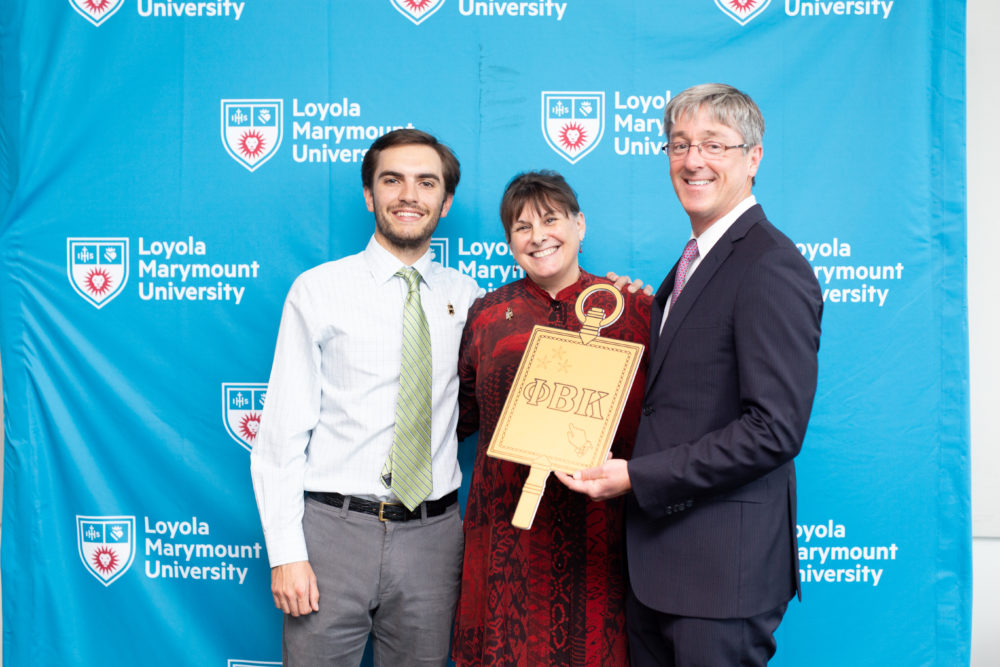
The Phi Beta Kappa Society installed a new chapter at Loyola Marymount University on Thursday, April 4, 2019. The ceremony included the induction of eight foundation members and nine students whose scholarship reflects breadth in intellectual perspective and service to mankind.
Phi Beta Kappa is the most renowned academic honor society in the United States. Founded in 1776 at the College of William and Mary in Virginia, Phi Beta Kappa has encouraged the values of a liberal education, excellence in intellectual achievement, and a life-long love of learning for more than 200 years.
Foundation members are inducted upon the installment of a new chapter. They typically include administrators, faculty, staff, and alumni whose lives and careers champion and reflect the ideals of a liberal arts and sciences education. Gregory Boyle, S.J. (MA 85′, English), founder of Homeboy Industries; Robbin D. Crabtree, dean of the Bellarmine College of Liberal Arts; Michael Engh, S.J. (BA ’72), president of Santa Clara University and former BCLA dean and professor; and Mary Beth Ingham, C.S.J. (’73, ’81), professor emerita of philosophy and member of LMU Board of Trustees, were among the inductees.
Students are selected for membership by the resident Phi Beta Kappa faculty and staff for demonstrating excellence of study across the liberal arts and sciences. LMU’s first class of inductees includes eight BCLA students: Cameron Bellamoroso (’20, Economics and Spanish), Erick Carranza (’20, Psychology and Spanish), Blake Colton (’19, Biology and Women’s and Gender Studies), Eunice Guadalupe Gonzalez (’20, Psychology), Alfredo Hernandez (’19, Political Science), Phaedra Johnson (’20, Spanish), Riley Nickel (’20, Economics), and Calvin Wong (’20, Psychology).

As a political science major and economics minor, class of 2019 valedictorian Alfredo Hernandez enjoys cultivating many different interests and using his gifts to help others. “To me, the value of interdisciplinary learning is finding the connections in seemingly disparate fields. In experiencing different disciplines, you have a broader foundation to pull from. And then you can have that beautiful experience of putting the pieces of the puzzle together, like when you can understand a math problem better because of things you have learned in a philosophy or music class. The beauty of interdisciplinary learning is finding the connections that exist between most things,” says Hernandez.
Members join a distinguished community that includes 17 U.S. Presidents, 40 U.S. Supreme Court Justices, more than 40 Nobel Laureates, and countless artistic, intellectual, and political leaders.
The society does not open a chapter on every college campus. Before a chapter is awarded, a university undergoes a rigorous evaluation process. With this year’s installments, there are now 290 chapters, representing only 10% of U.S. colleges and universities.
“Being selected to have a Phi Beta Kappa chapter at LMU affirms the exceptional quality of our faculty and their dedication to the liberal arts and sciences,” said Robbin D. Crabtree, dean of the Bellarmine College of Liberal Arts. “The quality of our academic programs was demonstrated unequivocally during the application process, with a critical emphasis on the role of our humanities-rich Core Curriculum as the central feature of an LMU undergraduate education. I’m also particularly gratified to know that The Phi Beta Kappa Society recognizes LMU’s deep commitment to academic freedom and shared governance, as these are abiding values we share. LMU is on the move in so many ways. As we stretch and grow, all the while we remain committed to our distinctive mission and its necessary foundations in the liberal arts.”



